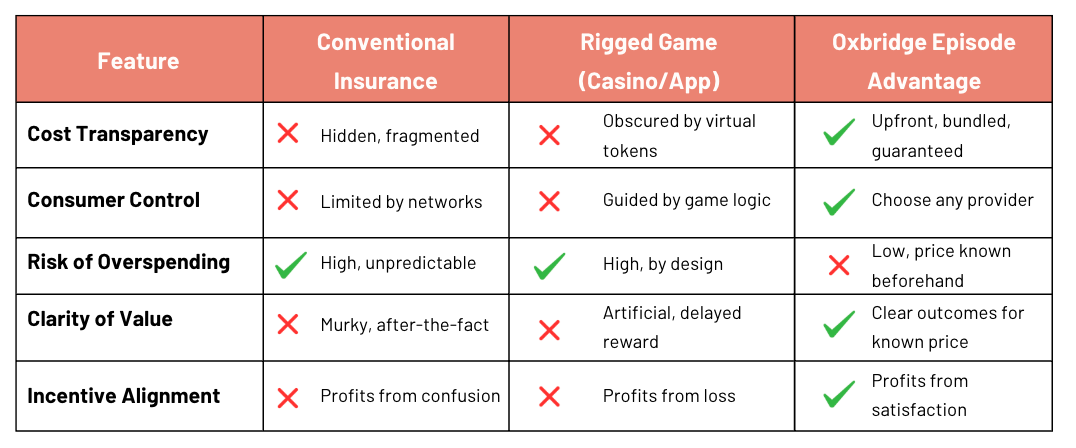Perspectives
The Game Is Rigged—Until It Isn’t
How Oxbridge Health Unleashes the Power of the Consumer in a System Designed to Confuse Them
In video games, casinos, and even social media apps, we’ve all seen the same pattern: opaque pricing, confusing systems, and a house that always wins. These environments are built to nudge the user into spending more without realizing it—and to limit control while maximizing profit.
It’s easy to recognize when a game is rigged. But what if the game was your health plan?Subscribed
For decades, the U.S. health insurance system has operated with the same logic as a pay-to-play game: confuse the rules, obscure the true costs, and profit from the chaos.
But a growing movement—led by innovators like Oxbridge Health—is exposing the rules and turning the game on its head. Oxbridge’s Episode Advantage program returns power to the people by making healthcare understandable, affordable, and shoppable.
Let’s compare how the old game stacks the odds against you—and how Oxbridge rewrites the rules to put consumers in control.
Rigged Games vs. Health Insurance:
Where Consumers Always Seem to Lose
Across digital platforms, manipulative systems share three traits that mirror conventional insurance:
1. Premium Currencies & Copays: The Illusion of Value
In mobile games, you don’t spend dollars—you spend “gems” or “tokens.” This sleight of hand detaches people from real value, making it easier to overspend.
In health insurance, the same trick plays out with copays, coinsurance, deductibles, and billing codes. These abstractions shield the true cost of care, making it impossible to understand the real price of a service—or prepare for it.
2. Opaque Odds: Confusion by Design
Casinos thrive on uncertainty: complex rules, hidden odds, and unpredictable outcomes.
Insurance mimics this chaos. Even with a card in your hand, you rarely know if a service is covered, what it costs, or if you’ll get stuck with a “surprise bill.” The rules are fuzzy—until you lose.
3. Friction and Delay as Profit Centers
In social platforms and gambling apps, rewards are dangled but hard to access. Withdrawals take time. Purchases are instant.
In insurance, approvals are slow, appeals are burdensome, and denials are common. The friction is intentional—because confusion creates revenue.
Enter Oxbridge Health:
Rewriting the Rules and Unlocking Consumer Power
Now imagine a system where the prices are clear, you know the cost up front, you can choose any provider, and you never get a surprise bill. That’s not a fantasy—that’s Episode Advantage.
Here’s how Oxbridge flips the script:
1. Fixed, Guaranteed Pricing for Complete Care
- One price. One episode. No surprises.
- Whether it’s a knee replacement or childbirth, you know the cost up front.
- No coinsurance games. No hidden bills.
2. Freedom of Choice, Not Network Traps
- Pick any provider—without fear of out-of-network penalties.
- Like booking a trip, you choose what matters to you: cost, quality, convenience.
3. Transparency That Empowers Action
- You see your options and know what they cost before making a decision.
- This isn’t just transparency—it’s empowered consumerism.
4. Protection Built In
- If something goes wrong, complications are covered in the episode price.
- The system accounts for real life, not just best-case scenarios.
5. A System Designed to Help You Win
- Engagement tools guide smart decisions.
- Rewards and insights drive smarter usage.
- It’s built for clarity, not confusion.
Comparison Snapshot: From Rigged to Empowered

The Takeaway:
Don’t Just Play the Game. Change It.
Health insurance, like rigged digital platforms, thrives on opacity and inertia. Consumers feel powerless because the system is designed to keep them that way.
Oxbridge Health doesn’t just offer a better plan. It offers a better philosophy: make care understandable, make prices shoppable, and give power back to the person receiving the care.
This is what happens when the consumer becomes the player, the chooser—and finally, the winner.